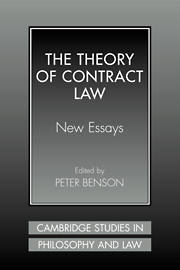Book contents
- Frontmatter
- Contents
- Acknowledgments
- Contributors
- Introduction
- 1 Two Economic Theories of Enforcing Promises
- 2 The Scope and Limits of Legal Paternalism: Altruism and Coercion in Family Financial Arrangements
- 3 Promises and Contracts
- 4 The Unity of Contract Law
- 5 The Theory of Contracts
- 6 Contract Law in the Aristotelian Tradition
- Index
4 - The Unity of Contract Law
Published online by Cambridge University Press: 05 October 2009
- Frontmatter
- Contents
- Acknowledgments
- Contributors
- Introduction
- 1 Two Economic Theories of Enforcing Promises
- 2 The Scope and Limits of Legal Paternalism: Altruism and Coercion in Family Financial Arrangements
- 3 Promises and Contracts
- 4 The Unity of Contract Law
- 5 The Theory of Contracts
- 6 Contract Law in the Aristotelian Tradition
- Index
Summary
Introduction
At the close of the twentieth century, the situation of contract law presents the following contrast. On the one hand, in both the common law and civil law the definitions of and mutual connections between the various principles of contract law are for the most part well-settled and no longer subject to controversy. Indeed, despite differences in formulation, the main elements of the law of contract are strikingly similar in both legal systems, and these systems, whether directly or by derivation, prevail throughout most of the contemporary world. The authoritative public articulation of the law of contract has achieved a certain apparent completeness and acceptability. The same cannot be said, however, of efforts to understand the law at a reflective level. In common law jurisdictions at least, there is at present no generally accepted theory or even family of theories of contract. To the contrary, there exist only a multiplicity of competing theoretical approaches, each of which, by its very terms, purports to provide a comprehensive yet distinctive understanding of contract but which, precisely for this reason, is incompatible with the others. Moreover, we seem to lack a suitable criterion by which to adjudicate among them, let alone to combine them in an ordered and integrated whole. The point has come when we appear to doubt the value and indeed the very possibility of a coherent and morally plausible general theory of contract, one that could gain wide acceptance.
- Type
- Chapter
- Information
- The Theory of Contract LawNew Essays, pp. 118 - 205Publisher: Cambridge University PressPrint publication year: 2001
- 13
- Cited by

